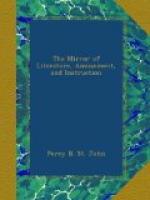With glow-worm lamp, and incense cull’d
Fresh from the bean-fields
breath;
And matin lark,—and vesper
thrush,
And honey-hoarded heath;—
A throne beneath the forest-boughs,
Fann’d by the wild bird’s
wing;
Of all the potentates on earth,
Hail to the GIPSY KING!
Tait’s Edinburgh Magazine.
* * * * *
AMERICAN PRISON DISCIPLINE.
(By the clever Schoolmaster in Newgate—See Fraser’s Magazine.)
It appears, from the testimony of Captain Basil Hall, R.N. that perfect as he describes the American prison discipline to be, yet “there is a gradually increasing culprit population growing up in America, of which the legislation cannot rid the country. These men, who may almost be called the penitentiary population, run the round just as I have observed with respect to the Bridewell at Edinburgh; the same men come and go, round and round again.” Well, then, nothing is accomplished in the way of reform, even under this lauded plan, which aims at the twofold object of efficient punishment and reformation, by enforcing reflection. Their error, and consequent failure in producing the good they expected, I conceive arises from their having neglected to adopt any plan for the improvement of the prisoners when they have separated them. They work, it seems, every day for years in silence, without intermission, except the time allowed for meals, which are always taken in solitude. The Bible is the only book allowed them—no paper nor pens: and this is called giving them habits of industry. I should say nothing can be more calculated to disgust them with every description of work all the rest of their days. If you can beget habits of industry, with a proportionate improvement of the mind, and an increased sense of the moral duties, which will bring right notions of meum and tuum, then habits of industry are of the utmost importance to the prisoner; as through these habits only can he obtain his bread, when brought to that state of mind which makes him prefer honesty to roguery. This can only be brought about by reflection, it is true; but I am afraid the term reflection, as here applied, is used in a very abstract sense. If it is meant the culprit should reflect on his having done wrong, I answer this he always does, under any punishment, however slight: he cannot but be aware of the cause which places him under coercion, and regret it. This kind of reflection only makes him more sorry for having been detected in his crime, than for having committed it. To reflect with advantage in solitude, there must be some materials stored in the mind; or books must be read to furnish these materials: if these be supplied, however unwilling a being may be to reflect, no mind will be long able to resist the temptation of mental employment, if in continual solitude. But if




